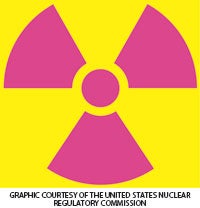NRC mulls action against Walter Reed in radiation case
 |
| The NRC's warning symbol for radioactive materials. |
The Nuclear Regulatory Commission (NRC) is deciding whether to take enforcement action against Walter Reed Army Medical Center, Washington, D.C., after two packages containing radioactive material for medical use were found nearly two days after they were left in the medical center's lobby.
The packages were left under a counter in the hospital's main lobby for about 44 hours, exposing staff and others who unknowingly passed by the packages to radiation levels the NRC deemed not hazardous, says Diane Screnci, senior public affairs officer, NRC. An initial inquiry determined the hospital may have violated two NRC regulations regarding proper handling of radioactive materials.
The packages were delivered on Saturday, May 1, to the hospital's concierge, who stored them under a counter in the main lobby. After the hospital's administrative assistant informed hospital officials he did not receive the packages as expected, they searched the medical center and found the packages on Monday, May 3, according to the NRC.
NRC requires that each hospital have a policy for receiving deliveries of radioactive materials, but the delivery did not follow standard policy at Walter Reed, the NRC inspection report says. The Nuclear Medicine Department was closed May 1, but delivery that Saturday was necessary due to a worldwide shortage of molybdenum-99, the NRC says.
The packages were to be delivered to the noncommissioned officer in charge of nuclear medicine, who also served as the administrative officer of the day (AOD) at Walter Reed. The AOD was the only person authorized to accept deliveries.
Instead, the packages were accepted by the concierge on duty, who did not inform the AOD that the packages had been received or where they were stored.
The NRC determined that the concierge on duty received a maximum of 46 millirems of radiation exposure and that the public received one millirem of exposure. The average person in the U.S. is exposed to 620 millirems annually from a variety of sources, Screnci says.
No one is believed to have been harmed by the materials, the NRC says. One package contained 1.5 curies of molybdenum-99 and the other contained 71 millicuries of thallium-201, both of which are used for diagnostics in the medical center's nuclear medicine program.
The NRC held a predecisional enforcement conference with Walter Reed officials on Sept. 1 so the hospital could explain what happened and what actions it has taken to prevent recurrence. The NRC will use that information along with information gathered during its own inspection to decide this month what, if any, enforcement action is necessary, Screnci says. The NRC could issue a notice of violation or a fine ranging from $3,500 to $7,000.
This is not the first incident involving misplaced radioactive material at Walter Reed. On May 22, 2009, the NRC issued a notice of violation to the medical center for failure to control radioactive material not in storage as required by NRC regulations and a failure to provide adequate radiation safety instruction to a medical student, who provided care to a brachytherapy patient. The hospital also was cited for failing to provide notification about the incident — which occurred Nov. 14, 2008 — in a timely manner.




